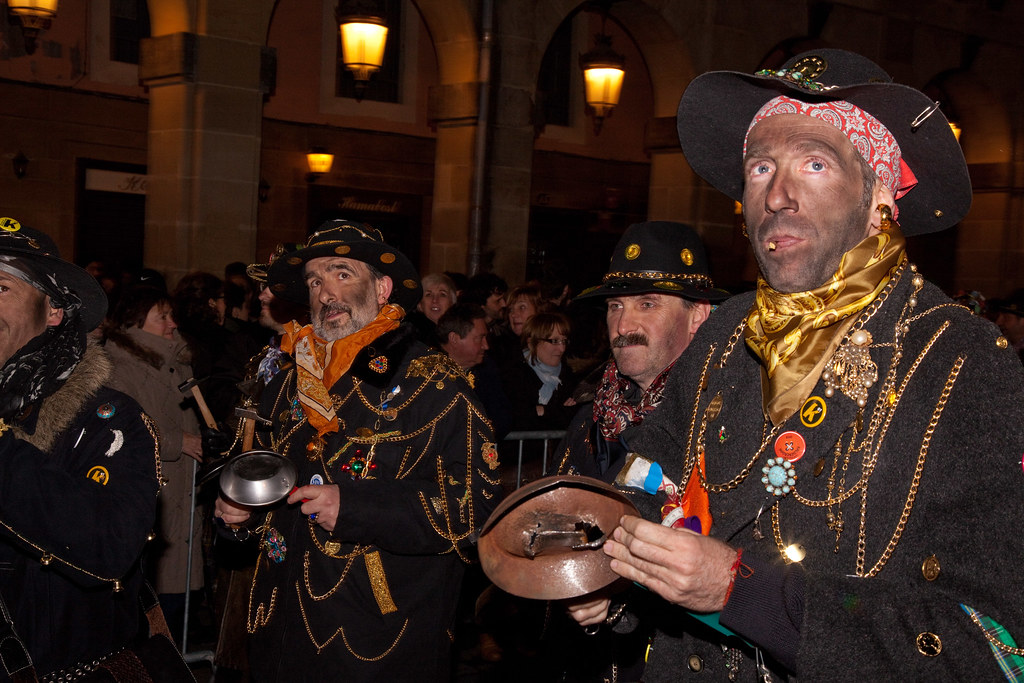No money for war
Since the Middle Ages the arms industry has been of great importance in the Basque Country. Knowledge of the technique of iron production since ancient times allowed the industrialized production of weapons.
However, the network of bars that generated fortune meant other social, ecological, legal and cultural changes. Weapons production privatized many communal forests. The heads of these workshops became ladies and gentlemen and structural changes were made to benefit them, largely stabilizing a system that has remained until today.
In front of the lords, another social agent is born: the rebels, a group that can fit into the first working class of the Basque Country. As everywhere, the small town has supplied the wealth of the upper classes and ours has been no exception. In the years that followed, it was often these rebels who stood up for the interests of the humble people, an interesting old.
On the other hand, while monarchies used to raise the wealth generated by production to feed the wars of the rich, the humble people began to suffer the consequences of wars.
The original Basque legal system had protection mechanisms to protect citizens from wars, such as the tradition of the “Malato del Bosque” or the legislature in which they were free from military service until the establishment of the state-nation model. Therefore, in the dispute between the humble people and the lords, in addition to the economic conditions, it was reflected in the attitude of war.
Basque public institutions cannot supply arms directly or indirectly. Active attitude to war is fundamental
Therefore, there is also an “anti-warring end,” there is always in us. With the introduction of compulsory military service both in the French State and in the Spanish State, the young Basques reacted with desertion and at the end of the twentieth century with input. In the referendum held in Hego Euskal Herria we also told NATO not.
Responsibilities
The four Members of Hego Euskal Herria are responsible for the main taxes. Historical evolution and the struggle over the centuries have ensured control of these taxes, but in return the so-called “quota” must be paid to the State. The expenditure on the quota is directly allocated to the expenditure on defence, police and border control. In this sense, we cannot forget the shameful action of the paramilitary organization “Frontex” at this time. The money of the deputies, our money, is intended to pay for a certain way of understanding ‘defence’.
However, the militarisation of our taxes is not limited to the quota, through tax policy and the amount allocated to the Basque Government, the armero sector of the Basque Country has various aids. Aid in taxes, research, awards -- our institutions are not neutral. When we denounce “war begins here” we denounce it above all for that, because our public institutions help with armaments.
It is time to move the demand for “ethical ground” to our institutions. Basque public institutions cannot supply arms directly or indirectly. An active attitude to war is fundamental.
About 82% of the money obtained by the Council comes from the income of workers and from daily consumption, that is, the class staff and the citizens of the sector pay mainly. As before with the Middle Ages, we now do not want to pay for their wars either.
There is no money for war!
Ana Gorostidi, Andoni Rodríguez and Patxi Azparren, members of the Gerrarik Ez Gipuzkoa Initiative
Bidali zure iritzi artikuluak iritzia@argia.eus helbide elektronikora
ARGIAk ez du zertan bat etorri artikuluen edukiarekin. Idatzien gehienezko luzera 4.500 karakterekoa da (espazioak barne). Idazkera aldetik gutxieneko zuzentasun bat beharrezkoa da: batetik, ARGIAk ezin du hartu zuzenketa sakona egiteko lanik; bestetik, egitekotan edukia nahi gabe aldatzeko arriskua dago. ARGIAk azaleko zuzenketak edo moldaketak egingo dizkie artikuluei, behar izanez gero.
Just as we experienced the flourishing of the Basque Country with the help of the artists, so that this time, taking advantage of their impulses, we continue to make our way together giving the necessary support to the Basque political prisoners, exiles and deportees
The... [+]
Epistemology, or theory of knowledge, is one of the main areas of philosophy, and throughout history there have been important debates about the limits and bases of our knowledge. Within this we find two powerful corridors that propose different ways of accessing knowledge: The... [+]
We learned this week that the Court of Getxo has closed the case of 4-year-old children from the Europa School. This leads us to ask: are the judicial, police, etc. authorities prepared to respond to the children’s requests? Are our children really protected when they are... [+]
I don't want my daughter disguising herself as a Gypsy in the caldereros. I don’t want Gypsy children at my daughter’s school to dress up as Gypsies in caldereros. Because being a gypsy is not a disguise. Because being a gypsy is not a party that takes place once a year, with... [+]
The year 2025 will lead to a general policy of establishing shorter working weeks, bringing low costs for new hires for companies and an effective direction of change in labour relations.
With the aim of complying with the Spanish government agreement, the reform to shorten the... [+]
To be honest, I don't know why I'm writing this. In today’s hostile environment, opinions of this kind are not well received. Perhaps LUZ will not publish this because it does not correspond to the opinions they have published so far (but if they have finally decided to publish... [+]
On January 15, the techno-business lobby called Cedarios presented its 6th report, Euskadi and the European Union, the shared destiny of prosperity and competitiveness. This neoliberal Think Tank, made up of eminent experts drawn from the world of finance, presented a magical... [+]
We Basques move our feet behind the witness of Korrika to proclaim that we want to survive as a Basque people in favor of our language, with the aim of the Basque Country we desire.
The tipi-tapa is the first step taken by a migrant person who leaves his homeland in Africa,... [+]
And for another year, the unions have organized prefabricated strikes for us. And we, individually, will decide whether or not to join the strike, without the need for any assembly at the school.
The strike model that I was taught is no longer in vogue, it seems. In my... [+]
Today, January 21, is a day to remember and reflect on an interesting ephemeris of our recent history. It is 50 years since the lockdown of 47 workers from Potase in Navarre. This lockdown, which lasted fifteen days, caused a general strike in Navarre, the Department of the... [+]
A couple of weeks ago, a number of data from Norway was published. In this country of Northern Europe electric cars have predominated, being the Tesla brand the most sold, with 90% of recyclable energy consumed there. On the contrary, Norwegian public enterprises have no problem... [+]
These were my last words when we left, held hand in your deep breathing sleep. Your heart stayed forever without a special, simple, dignified pain. As you want and demand. How we want and respect.
Already a month before the arrival of winter, the last days of the longest night,... [+]
Today, the voices of women and children remain within a culture that delegitimizes their voices, silencing their experiences, within a system aimed at minimizing or ignoring their basic rights and needs. A media example of this problem is the case of Juana Rivas, but her story... [+]












.jpg)